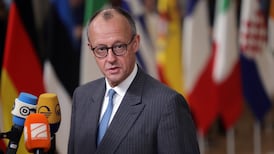Two interventions by Angela Merkel in the debate over Britain’s future membership of the European Union over the past 10 days have raised the stakes in the debate over a possible British exit from the EU.
According to the Sunday Times of October 26th, the German Chancellor told the paper she would not support David Cameron's plans to limit freedom of movement rules as part of his planned renegotiation of Britain's membership of the EU.
This weekend, German weekly Der Spiegel reported that Merkel would prefer to see Britain leaving the EU than change EU free movement rules.
The comments by Chancellor Merkel – proudly seen by many in Westminster as a strong Cameron ally – have again re-focused attention on the Conservative Party’s EU strategy.
The British Prime Minister, who urged his fellow Tories to stop "banging on about Europe" in his first speech as leader in 2006, has revealed a remarkable lack of understanding about the realpolitik of the European Union.
The German Chancellor’s reported comments come at the end of a turbulent few weeks for Mr Cameron. The defection of Tory MP Douglas Carswell to the UK Independence Party (UKIP), winning the eurosceptic party its first Westminster seat last month, has rattled the Conservatives less than seven months out from a general election. A second byelection in Rochester on November 20th, could deliver a second UKIP seat.
The Tory strategy so far has been to follow UKIP’s lead on immigration, rather than confront Nigel Farage’s flawed and delusional policy on the European Union.
Rather than set out why the Conservative Party believes it would be better for Britain to remain within a reformed European Union –the stated position of Mr Cameron and the Conservative Party – the British Prime Minister instead has hinted at changes to EU free movement rules that can never be delivered.
Ever since his so-called “Bloomberg” speech of January 2013 in which he committed to a referendum on EU membership by 2017 if the Conservatives win the next general election, the prime minister has been criticised for a lack of detail on what exactly he is seeking to renegotiate with the European Union. It is widely expected that Mr Cameron will deliver a key speech before Christmas outlining some of the changes he is seeking from the European Union, focusing on immigration. But the proposal that Britain may introduce a “cap” on immigrants from certain countries have been rejected as unworkable by senior EU officials including European Commission president Jean-Claude Juncker, and EU leaders such as Danish prime minister Helle Thorning-Schmidt and Angela Merkel.
The revelation last week that Britain must contribute an extra €2.1 billion by December 1st to the EU budget – always a sensitive issue for the British public – also emerged at a difficult time. While Mr Cameron’s fury at having to pay an extra charge due to Britain’s strong economic performance and a recalculation of gross national income figures, did elicit some sympathy, the main upshot of the debacle was to reveal an incompetency at the heart of the relevant government departments. Suggestions that Chancellor of the Exchequer George Osborne – rumoured to have minimal interest in EU affairs – had been made aware of the extra charge ahead of the summit suggested a Government that does not have a handle on EU affairs.
The limitations that Britain will face in renegotiating EU free movement rules means that any change to immigration policy announced in Mr Cameron’s forthcoming speech is likely to focus on changes that can be made to Britain’s own benefits system, which, unlike many other EU countries, is based on a non-contributory model.
Mr Cameron’s conundrum, however, is that whatever he promises on immigration and EU reform is unlikely to satisfy the significant euro-sceptic minority within his own party.
By panicking in the face of a possible voter exodus to UKIP in next May’s general election – and perhaps with an eye to the career ambitions of the euro-sceptic Boris Johnson – Mr Cameron is, to many people, putting the interests of his party over the country by leading Britain closer to an EU exit.










